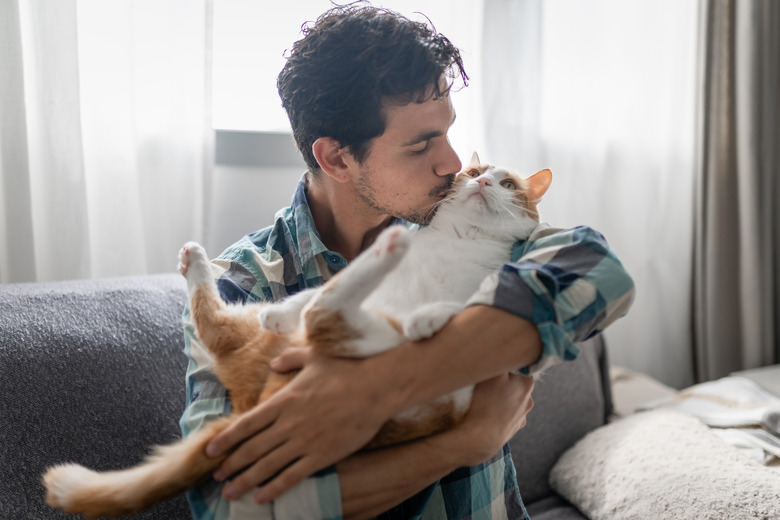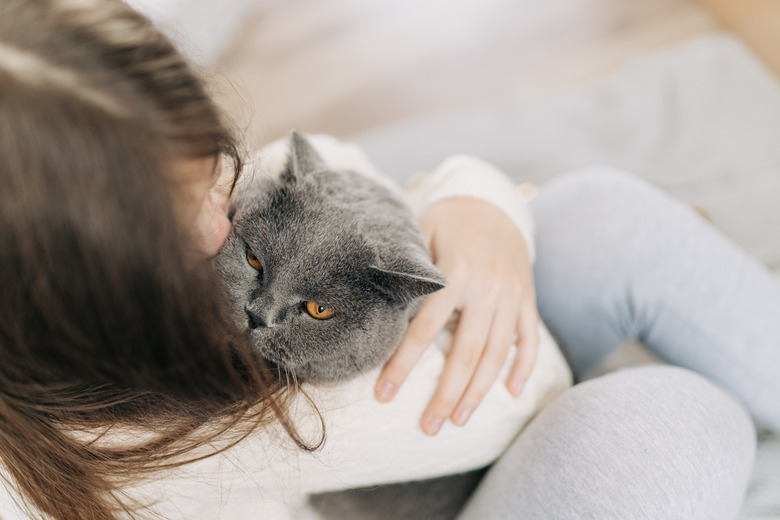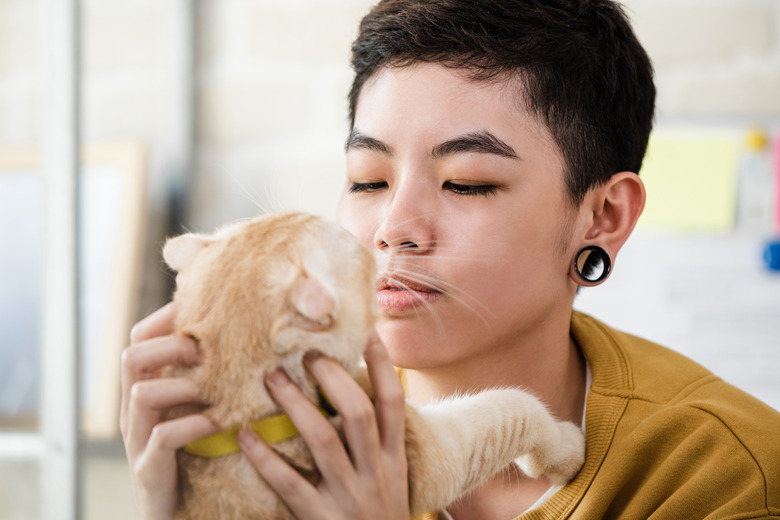Why Does My Cat Bite My Chin?
Most cat lovers understand that nibbles, swipes, scratches, and the occasional "for real" bite are all part of the joys of living with felines.
Although biting is a common cat behavior, it can be slightly unsettling — especially when your cat locks their chompers around your chin. So much so, that many of our readers have asked us one simple question: Why does my cat bite my chin?
Is chin biting simply a sign of affection? Or is there something more to it?
Reasons why cats bite chins
Reasons why cats bite chins
Felines have a number of puzzling behaviors that make sense to them but are quite baffling to humans. Many pet parents are confused about chin biting because, well, isn't biting a bad thing? There are several reasons why your cat bites your chin. The good news is that these reasons are mostly benign and nothing to worry about.
Affection
Affection
Since cats do not have opposable thumbs with which to give us a firm handshake, they greet us in other ways. Your moggie may display affection through:
- Purring
- Proximity (sitting on you)
- Kneading your lap ("making biscuits")
- Nibbling your hands and chin (allogrooming)
Allogrooming is a type of caregiving through physical contact. Typically, it occurs between the same species. So if your cat is nibbling on your chin, congratulations! Not only is allogrooming an indicator that they see you as an equal, but it's also a sign that your cat is bonding with you.
Overstimulation
Overstimulation
Sorry, human, but sometimes your love and attention can just be too much of a good thing. When your cat bites your chin during a cuddle or playtime, it could be what veterinarians call petting-induced aggression. Essentially, your cat has had too much stimulation, and the chin bite is their way of asking you politely to go bother someone else.
You can avoid petting-induced aggression by watching for signs of irritation while you interact with your kitty. Signs your cat may be about to give you a little swat or a bite include:
- Fur on the back of their coat rises
- Twitching tail
- Folded ears
- Pupil dilation
- Purrs turn to growls
- Increased heart rate
If you witness a stress response, back off and give your mouser some space.
Stress or illness
Stress or illness
When cats feel anxious or unwell, they are often more likely to show signs of aggression, which include biting. Your cat may need more space and less attention when they're feeling crowded or experiencing discomfort from an injury.
Although it's uncommon, some cats have a disorder called feline hyperesthesia syndrome where they experience pain when they are stroked along their spines. Signs of hyperesthesia include:
- Biting their tails, front legs and paws
- Skin rolling or rippling on their backs
- Pain when the muscles along the spine are stroked
If you suspect that your cat suffers from these symptoms, your vet will be able to diagnose hyperesthesia and treat the condition with medication.
What to do when a cat bites your chin
What to do when a cat bites your chin
Ninety percent of the time, when your cat bites your chin, it's just a little love bite. Although, this doesn't mean it's pleasant for humans, especially young children who may not understand why their best friend is "mad at them.
Don't punish
Don't punish
Never punish a pet. Animals do not grasp human motivations, and your cat is cognitively incapable of understanding punishment. Getting angry with your cat will never achieve its intended effect.
While felines may not take to training as well as dogs, they do, in fact, respond to positive reinforcement. So spend some time reinforcing good behaviors with treats, a clicker, or any of these cat training techniques.
Give them space
Give them space
Instead of getting mad, give your cat space when they bite your chin. Understanding your moggie's body language will help you to understand what they're communicating before a bite or scratch occurs.
Redirection and enrichment
Redirection and enrichment
When your kitty expresses stress and anxiety, the best course of action is to redirect their attention with cat toys. Keep several near areas where you usually interact with your cat like the couch, bed, or home office.
And if you haven't given your cat the gift of a laser pointer, what are you even doing in life?
You don't have to spend a lot of money, either. The best cat toys are often homemade using objects commonly found around the house.
Also, you can encourage a climate of enrichment and activity around the household with cat trees, puzzle feeders, and other objects that mentally stimulate your kitty.
Watch for signs of illness
Watch for signs of illness
Chin biting is a common cat behavior and usually not something to worry about. Still, if you suspect that your cat is exhibiting signs of aggression or expressing other indicators that they may be sick, be sure to follow up with your veterinarian.
In summary
In summary
Cats express themselves in a variety of ways to their humans. Purring, kneading, and, yes, biting are all forms of communication that need interpretation — and unfortunately, even after translation, these expressions still might not make much sense.
Chin biting is one such bizarre trait, but it's usually nothing to worry over. By reading your cat's body language and using positive reinforcement, you can "tell" your cat that you don't much care for chin nibbling. (But it's anybody's guess if your cat will actually care.)


